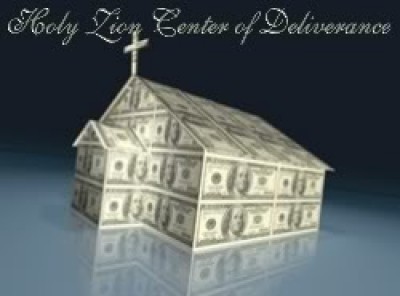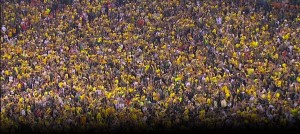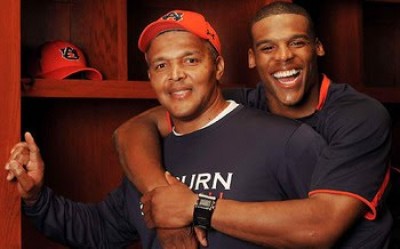This week, one of the most egregious cases of pay-for-play extortion in the history of college football was ruled by the NCAA to be a non-issue. Despite sworn testimony indicating that the father of former Auburn quarterback Cam Newton sought some $180,000 in compensation from Misissippi State University, before his son eventually signed with the Auburn Tigers instead, the governing body of college football ruled against finding any wrongdoing.
Let’s be clear, however, that there is a difference between innocence and the lack of a smoking gun to enable conviction. That Auburn has avoided punishment is not because they have played the recruiting game honorably.
While Auburn may be breathing a sigh of relief, the NCAA’s decision isn’t just something for Oregon and Alabama supporters to abhor. In clearing the Newtons and the school to which they awarded Cam’s services, the National Collegiate Athletic Administration has created a whopper of a double standard given how it punished Reggie Bush and USC just one year earlier for the same basic offense. What’s more, failing to punish Auburn and the Newtons has created a dangerous precedent: cheat and you might get caught, or you might ride the wave all the way to a national championship and get away with it scot-free.
Let’s recap this appalling failure of the system.
On December 1, 2010, the NCAA announced that Cam Newton had been declared ineligible by Auburn after having found evidence that Cecil Newton did in fact solicit Mississippi State for money in exchange for Cam Newton’s athletic service. In other words, his guilt was confirmed. That means that even if the Newtons didn’t have a pay-for-play arrangement with Auburn—which based on the testimony of its own former players (on HBO’s “Real Sports with Bryant Gumble”) has done this before—the Tigers were guilty of playing with an ineligible player.
But instead of enacting punishment for this proven case of extortion, at Auburn’s request the NCAA quickly reinstated Newton just days after he was declared ineligible. As a result, Newton was allowed to play in the 2010 SEC Championship Game three days later. The NCAA stated at the time there was not sufficient evidence that Cam or anyone from Auburn had any knowledge of Cecil Newton’s actions soliciting pay-for-play. In other words, the NCAA said it was alright to cheat if deniability of the player was maintained—directly contradicting its actions with the Reggie Bush decision.
Don’t take my word for it. Like you, I’m a bitter Duck fan who was expecting justice.
After the NCAA’s decision in December, ESPN’s Gene Wojciechowski wrote, “Did the NCAA do what I think it did? Did it basically rule that a father and a third party can actively, brazenly and with impunity shop a player around for hundreds of thousands of dollars—and the worst thing that happens is a father has to lie low and the third party has to disassociate himself from the programs in question? Did it just get embarrassed by a rules loophole the size of Jordan-Hare Stadium, the gist of it being: Your old man and another guy can put you on the open market, but as long as you don’t know about it, you’re good to strap it up for the next big game? The answers: yes and yes.”
No one ever found evidence directly linking Auburn to illegal payments to the Newtons, which is why the school has avoided its date with justice. There just wasn’t the smoking gun that there had been in the Bush/USC investigation (an insider willing to talk). Even so, the attempted extortion with Mississippi State was enough to make the younger Newton ineligible, regardless of his awareness he was his father’s chattel. What’s more, circumstantial evidence strongly suggests Cecil Newton got paid by someone. After the rural church where Cecil ministers (!) had previously been threatened with condemnation before Cam arrived at Auburn, it was magically renovated afterward. The money to fund the large renovation project didn’t come from God, and it didn’t come from pocket change placed in the collection basket.

A more proper representation of Cecil Newton's church post-renovation, courtesy of tigerdroppings.com
It was bad enough to lose the national championship on the last play of the game, a crowning moment of 117 years of Oregon football turned into the ultimate heartbreak. But as we shed tears that night in Glendale, there was one saving grace, one reason to be hopeful: that the NCAA might finally bring Auburn to justice. It wasn’t going to be about revenge for the Ducks and winning a game off the field that we lost on the field. Instead, it was crucial to know that, whatever disappointments might come from falling short on the gridiron itself, at least the integrity of college football itself would one day be restored.
Oregon has spent most all of its history as one of a David-fighting-Goliaths. While programs like Ohio State, Alabama, Auburn, and LSU have most of the advantages in recruiting and in donor contributions, the Ducks are in a small state, far from the nation’s population centers. We lack the storied tradition that attracts players to top teams. Yet with the help of one big donor (Phil Knight) and decades of scrappy play, the Ducks have made a valiant uphill climb to buck the odds.
Even so, the program’s rise has been subverted arguably not on the field but by the system of college football itself. In both of the seasons the Ducks were in striking distance of a national championship, circumstances rather than an opponent got in the way.
First there was 2001, in which the Joey Harrington-led Ducks were the consensus #2 team in the nation, achieving that ranking in both the Associated Press and ESPN/USA Today coaches polls, only to be left out of the national championship game in favor of Nebraska, a team blown out in its conference championship game by Colorado (the team Oregon then blew out in the Fiesta Bowl).

Joey Harrington and the Ducks celebrated a Fiesta Bowl victory in 2002, but questions linger if instead it should have been the Rose Bowl for the national championship
Now there’s 2010, in which the undefeated Ducks made it to the BCS title game only to face a team whose quarterback never should have been allowed to play.
As I write this, thousands of protesters are occupying not only Wall Street in New York City but city centers across the nation. If I could, I would start an occupation of my own: of the NCAA headquarters in Indianapolis, Indiana. I’d suggest that the real NCAA acronym seems today to be “Notoriously Corrupt Auburn Apologist.” I’d ask NCAA president Mark Emmert why Knute Rockne and Amos Alonzo Stagg were turning in their graves? I’d implore some executive there to remove the dagger from my back and those of Oregon fans everywhere.
Maybe someday Oregon will win that elusive national championship and the pain of what was lost – or taken away – will subside. Maybe in the future a new generation of leaders at the NCAA will revisit the current body’s ruling on Auburn and utter a collective, “Huh?” Maybe Tigers head coach Gene Chizik, who after the championship game suggested God was an Auburn fan, will eventually have a rendezvous with a bolt of lightning.
Until then, however, we who wear the green and yellow will just have to make this travesty of justice an inspiration on the field. I already never have a voice when I leave Autzen Stadium, having screamed my vocal chords away for the Ducks. But somehow I’ll need to find a way to scream even louder, to exorcise the demons of Indianapolis and Glendale. But I also refuse to turn the other cheek on this one.
I mentioned USC and Reggie Bush earlier as a comparison between two pay-for-play scandals, one that went unpunished and one that didn’t. But rather than Bush, perhaps the Trojan back who most truly comes to mind here is OJ Simpson – not because he resembles Newton on the field, but as a symbol of those who are exonerated by the system but never in our collective minds.
Of course there may still be another chapter in the saga of Auburn and Oregon. Despite the Tigers apparently getting away with playing an athlete whose father shopped him like a used car salesman, Oregon still has an NCAA investigation of its own that remains unresolved. So now we face the very real possibility that college football’s governing body may punish the Ducks and not the Tigers.
If Chip Kelly’s program is indeed found guilty of exploiting a loophole in the regulations that govern recruiting, while Auburn goes unpunished for not exploiting a loophole but knowingly subverting the foundational principle of amateur athletics, then the injustice may finally be too much to take. What would we do then? I can’t even imagine, but the slogan of Auburn’s arch-rival, Alabama, comes to mind: “Roll tide.” Roll a tide of justice to wash out the filth. Roll the tide of a new governing body to replace the NCAA. Roll out the naïve illusion scam of amateur athletics and roll in with a minor professional league.
It’s one thing for Oregon to lose a heartbreaking battle on the field. It’s another to lose out to an NCAA ruling. But to lose the sense that college football is a fair, winnable game in which every team can compete for a title without fear of the system abandoning them? That makes me want to put the “fighting” in Fighting Ducks.
Related Articles:
Chip Kelly Update: Everything's Good Again ...
Chip Kelly Update: Wailing and Gnashing of Teeth
Shock and Awe -- The Oregon Ducks' Football Hangover Effect
Despite Lopsided Score, Georgia State "Never Stopped Believing"
Hope Springs Eternal for Ducks
Incompetent Pac-12 Officials: How Do You Miss ALL of THIS?
Brian Libby is a writer and photographer living in Portland. A life-long Ducks football fanatic who first visited Autzen Stadium at age eight, he is the author of two histories of UO football, “Tales From the Oregon Ducks Sideline” and “The University of Oregon Football Vault.” When not delving into all things Ducks, Brian works as a freelance journalist covering design, film and visual art for publications like The New York Times, Architect, and Dwell, among others.



